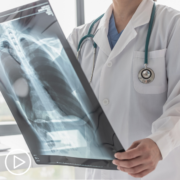Advanced Prostate Cancer Outcomes: Addressing Disparities and Exploring Solutions
Advanced Prostate Cancer Outcomes: Addressing Disparities and Exploring Solutions from Patient Empowerment Network on Vimeo.
Does research in advanced prostate cancer address the disparities in outcomes among different racial and ethnic groups? Dr. Ronald Chen from University of Kansas Medical Center speaks to contributing factors, how far we have come and ongoing efforts.
See More from [ACT]IVATED Prostate Cancer
Related Resources:

|

|

|
Transcript:
Lisa Hatfield:
How does your research address the disparities in prostate cancer outcomes among different racial and ethnic groups? And also, what are some of the key factors contributing to these disparities?
Dr. Ronald Chen:
I think there’s been a lot of research by my group and others looking at disparities in prostate cancer. And prostate cancer really is a shiny example of disparities. And what I think a lot of researchers has found is that, in prostate cancer there are clear disparities by a patient’s race. And what we know is that Black patients with prostate cancer have pursued less aggressive treatment, have more delays in treatment, and are twice as likely to die from prostate cancer compared to white patients, and that’s really a large gap that we need to do more research on to close.
With every cancer, and prostate cancer is no exception, screening is so important. If we’re able to screen and diagnose a cancer as early as possible, that gives us the best chance to cure cancer and for the best outcome for the patient. So access to screening is very, very important. I cannot stress that enough.
Access to clinical trials is also important. Clinical trials are the way for patients to access the latest, most promising treatment available. And we actually know from a lot of research that patients who are on clinical trials do better, live longer than patients who are not on clinical trials, and I think a lot of it’s because of the access to the latest agents. And so, being able to try to tackle this issue of access to screening for early detection and access to clinical trials, I think will be really important for us to tackle and reduce and minimize and eliminate the disparities that we see in prostate cancer.
I think the other really important aspect of disparities is actually also, I think, patient knowledge. Not every patient who has cancer who goes to see a specialist and they’re told the information, I don’t think that as physicians we do a good enough job of explaining a patient’s diagnosis and options to patients. And what we know from research is that a lot of patients leave the consultation not completely understanding what they were just talking about. They may not know how aggressive the cancer is, they may not know exactly what options are available, and I think that’s the communication aspect, whether it’s from the physician side or from the patient’s receiving side, we know that that’s not as good as possible.
And we also know that when a patient does not fully understand their diagnosis, that might lead to wrong decisions about delaying treatment and about wrong decisions in terms of choosing treatments that’s less aggressive than it should be. And so I think being able to work on better communication, better understanding of the critical information that’s transferred during consultation, I think, will be another way to address disparities that we see in prostate cancer.
Lisa Hatfield:
Great. Thank you. And backing up just a little bit, when you were talking about one of the factors being geographical rural area, if you had a patient come in and say, “Hey, I just read about this trial, but I live really far away from an academic center, a center that is running this trial,” do most clinical trials require a patient to live close to that center if they want to access a trial, or can they just check in occasionally? How do those typically work?
Dr. Ronald Chen:
I think that patients who live far away from a major cancer center can still find ways to participate in clinical trials because not all clinical trials require a patient to live close by. I’ll give an example.
I work at the University of Kansas Cancer Center, and we offer a lot of clinical trials. We understand that Kansas is a rural state, and we have a lot of places in Kansas where patients don’t live close to where we are in Kansas City. So what we have done at the University of Kansas Cancer Center, is actually, we have partnered with a lot of the smaller cancer programs around the state, so then we can all offer the same clinical trials. Even though, even trials that we offer at University of Kansas in Kansas City, through our partnership with smaller cancer centers around the state, patients can actually enroll in clinical trials and be treated closer to home on the same trial.
So I think that really increases access. But that’s only possible if a patient has heard about that opportunity and are able to then seek that out. But the network has been set up in our state, and some other cancer centers around the country have similar networks to try to increase that access.
I think the other thing to say is that there are many clinical trials for advanced prostate cancer using chemotherapy and more increasingly, oral pills to treat cancer. And you can absolutely have the opportunity of signing up for a trial, and if that includes a new treatment that’s an oral pill, maybe you only have to go for a visit every few months for a check-up, but you can take that prescription and the pill at home without having to have frequent visits. And I think that also makes a clinical trial participation feasible for a lot of patients.
So I really do think that, I think we’ve made a lot of improvements in clinical trial access over the past few years. I actually think the COVID pandemic has forced us to think about how to do this, and I think we’re doing a better job than we were five years ago. And so, I think even for patients who live in rural areas, clinical trial participation is possible in a lot of situations.









